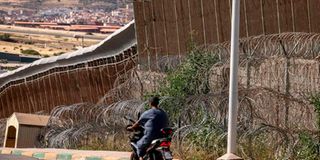AU urges probe into migrants' deaths at Morocco-Spain border

The border fence separating Morocco from Spain's North African Melilla enclave near Nador. The AU has called on authorities in Morocco and Spain to investigate the deaths of African migrants at the border between the two countries.
The African Union (AU) has called on authorities in Morocco and Spain to investigate the deaths of African migrants at the border between the two countries.
In a statement, the AU Commission chairperson Moussa Faki Mahamat expressed shock at the treatment of the migrants by security forces at the border between the two countries.
Reports show armed Moroccan security officers beating and shoving the detained migrants in what human rights groups have described as the deadliest incident at the Spain-Morocco border in recent memory.
Hundreds of migrants stormed a fence separating the two countries in a bid to cross over to Spain via the enclave of Melilla.
23 dead, several injured
According to Moroccan authorities, 23 people have died and several others injured. However, other sources, notably the Spanish NGO Walking Borders, put the death toll higher, at at least 37.
The incident which occurred on Friday, June 24, has once again rekindled debate about the worrying trend of irregular migration and its consequent human rights implications.
Reports indicate that around 2,000 mostly sub-Saharan African citizens were involved in the incident. Many of them are said to be from Sudan, which is engulfed in a political crisis sparked by a military coup.
Media reports also say that more than 500 managed to enter a border control area after cutting through a fence with shears.
Some of the victims fell from the top of the barrier while attempting to scale it, Moroccan officials were quoted saying.
Degrading treatment
The AU Commission chairperson said he was shocked and concerned by “the violent and degrading treatment” of the migrants.
"I express my deep shock and concern at the violent and degrading treatment of African migrants attempting to cross an international border from Morocco into Spain, with the ensuing violence leading to the deaths of at least 23 people and injuries to many more," Mr Mahamat said on Twitter.
And in the statement released by his office, Mr Mahamat called for an immediate investigation into the matter. He reminded all countries of their obligations under international law to treat all migrants with dignity and to prioritise their safety and human rights while refraining from using excessive force.
Human rights groups have also demanded an investigation into the incident.
The Moroccan Association for Human Rights (AMDH) described the incident as "a true catastrophe that shows the consequences of the latest Moroccan-Spanish entente".
Diplomatic ties
The incident comes just weeks after the two countries mended diplomatic ties broken after Spain angered Morocco for its support of the Western Sahara separatist movement.
The row begun when Madrid allowed Brahim Ghali, a leader of the pro-independence Western Sahara Polisario Front group, to be treated for Covid-19 in a Spanish hospital in April 2021.
For the next one year, Morocco allowed migrants to easily pass through its borders to Spain. The area is home to Melilla and Ceuta, the European Union's only land borders on the African continent.
The migrants usually climb the barriers, swim along the coast or hide in vehicles.
Friday's incident was said to be the first mass incursion since the two neighbouring countries mended their diplomatic ties. It also followed a visit to the Moroccan capital, Rabat, by Spanish Prime Minister Pedro Sanchez in April.
Prime Minister Sanchez on Saturday called the migrant rush an “attack” on his country’s "territorial integrity", for which he blamed human traffickers.
"If anyone is responsible for everything that happened at the border, it is the mafias that traffic in human beings,” he told journalists in Madrid.
Demand for probe
But several NGOs, among them AMDH, Walking Borders and Amnesty International Spain, on Saturday issued a joint statement demanding a probe into the treatment of the migrants.
AMDH, in a separate statement, warned against burying the migrants' bodies until their deaths are properly investigated through a "comprehensive, quick and serious enquiry to determine responsibilities and shortcomings".
The Moroccan rights group also published an image showing authorities from the North African country digging graves, which it says were meant to bury those who died in the border incident.




